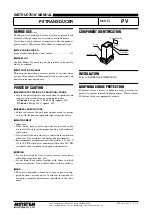
Revision 1.0
SMV800 Modbus User's Guide
Page 33
Input Open Fault Detect
WARNING
: To accurately set the device status and device
output, it is highly recommended to enable break detect in
order to detect a input open fault.
The behavior of the device and process values is explained below when this setting is OFF vs ON
to explain why it is recommended to configure this setting ON always.
If the Sensor input Fault detect is OFF:
The reported temperature value may or may not be reported as a fault condition depending upon
how the open T/C connection drifts. For active temperature compensation during flow calculations
an undetected open thermocouple may result in a condition where the reported flow value is
inaccurate. For this reason, it highly recommended that open thermocouple detection is turned on
so that the active temperature is used for flow compensation.
When the open input condition occurs, device will report non-critical status, but Flow calculation
will use the reported Temperature value. Note that this case may result in inaccurate Flow value. If
the sensor is repaired, the status is cleared without device reset.
If the Fault detect is ON:
On detecting open input, device will report critical status, Temperature value will be set to NaN
and Flow value will also be set to NaN.
Background
You can turn the transmitter’s temperature sensor fault detection (Break Detect) function ON or
OFF through configuration.
With the detection ON, the transmitter drives the PT output value to NaN in the event of an
open RTD or T/C lead condition.
When fault detection is set to OFF, these same fault conditions result in the transmitter not
driving the output to failsafe and reporting a non-critical status for an open RTD sensing
lead or any T/C lead. But when an open RTD compensation lead is detected, the
transmitter automatically reconfigures itself to operate without the compensation lead. This
means that a 4-wire RTD would be reconfigured as 3-wire RTD, if possible and thus
avoiding a critical status condition in the transmitter when the transmitter is still capable of
delivering a reasonably accurate temperature output.
Process Temperature Range Values (LRV and URV)
The Lower Range Value and the Upper Range Value fields for PT are found on the
Process
Temperature Config tab
.
Configure the LRV and URV (which are desired zero and span points for your measurement range)
for the process temperature input by typing in the desired values on the
Process Temperature Config
tab.
•
LRV, enter the lower range value (default = 0.0)
•
URV, enter the upper range value (default = URL)
Summary of Contents for SMV800
Page 82: ...Page 70 SMV800 Modbus User s Guide Revision 1 0 ...
Page 95: ...Revision 1 0 SMV800 Modbus User s Guide Page 83 2 5 4 Review ...
Page 99: ...Revision 1 0 SMV800 Modbus User s Guide Page 87 ...
Page 100: ...Page 88 SMV800 Modbus User s Guide Revision 1 0 ...
Page 101: ...Revision 1 0 SMV800 Modbus User s Guide Page 89 ...
Page 102: ...Page 90 SMV800 Modbus User s Guide Revision 1 0 ...
Page 103: ...Revision 1 0 SMV800 Modbus User s Guide Page 91 Maintenance Menu ...
Page 104: ...Page 92 SMV800 Modbus User s Guide Revision 1 0 2 7 1 Advanced Diagnotics Menu ...
Page 105: ...Revision 1 0 SMV800 Modbus User s Guide Page 93 2 7 2 Monitoring Menu ...
Page 112: ...Page 100 SMV800 Modbus User s Guide Revision 1 0 ...
Page 116: ......
















































